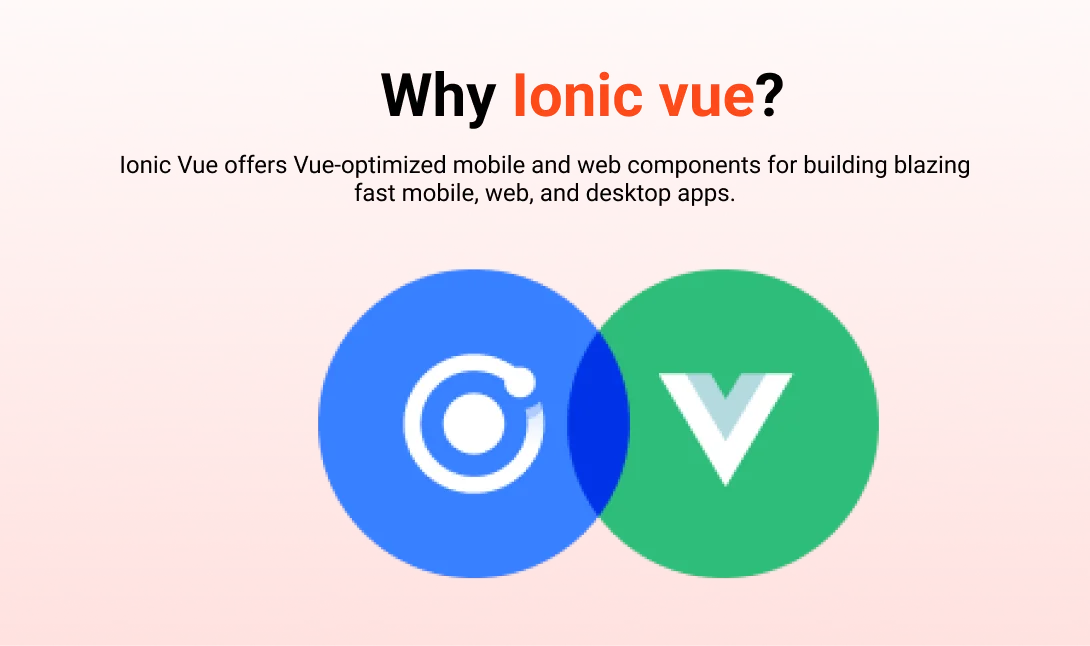

Vue Js


Ionic vue is the platform that is used to build a mobile application for Android/ios using vue.js.
Flutter is used for natively built applications for Android/iOS using Dart, while Ionic is a framework that builds applications for Android/iOS using web technologies like Vue, React, Angular, etc. The choice between Flutter and Ionic depends on the requirements of the project because both have advantages and disadvantages. If you're looking to leverage Ionic's capabilities, you might also consider Hire Vue js Developers to fully utilize its potential.
Yes, ionic is worth learning because ionic allows developers to easily build a mobile application for Android/ios using web technologies.
Ionic is a fronted UI framework that is used to build an application using web technologies.
Ionic vue is the UI framework that is used to build mobile apps using web technologies and vue native is used for the build apps using the Vue.js
Ionic provides the UI components for building the hybrid mobile apps and the capacitor provides its own set.
Yes, vue js is good for large applications because it is more scalable and flexible than others.
Yes, ionic is a free framework for all web technologies to build mobile apps for Android and ios platforms.
No,vue is used to build a single-page application and fronted web app interface. Vue is not able to build native mobile apps. You can create your mobile apps using the ionic vue.
The downside of Ionic lies in its performance limitations compared to native apps. Since Ionic utilizes a webview to display its UI, it may not offer the same level of speed and responsiveness as fully native applications. However, the trade-off is that Ionic allows for rapid development using web technologies, making it a viable option for certain projects where performance is not the primary concern.
When considering alternatives to Ionic, React Native often emerges as a popular choice. React Native has gained significant popularity for native app development, offering better performance compared to Ionic due to its ability to render components directly using native APIs.
React Native also boasts a sizable and vibrant community, a wide range of library support, and easy interaction with pre-existing native codebases.
However, the choice between Ionic and React Native ultimately depends on the specific project requirements, resources, and the desired balance between development speed and performance.
Yes, Ionic can be used for web development. While Ionic is primarily known for its ability to develop hybrid mobile applications for Android and iOS using web technologies, it also provides UI components that are suitable for web development. With Ionic, you can create web applications with a consistent look and feel across different platforms, leveraging its pre-built UI components and cross-platform compatibility. This allows developers to reuse code and resources when targeting both mobile and web platforms, making Ionic a versatile framework for web development as well.
No, Ionic is not made by Google. Ionic was created by a company called Drifty Co. in 2013. The founders of Ionic are Max Lynch, Ben Sperry, and Adam Bradley. While Ionic has gained significant popularity and support from the developer community, it is an independent framework and not directly affiliated with Google.
Ionic and Bootstrap are both popular frameworks, but they serve different purposes. Bootstrap is primarily a front-end framework for building responsive and mobile-friendly web applications. It provides a set of CSS styles, JavaScript components, and pre-designed templates to simplify web development.
Ionic is a hybrid mobile app development framework using HTML, CSS, and JavaScript for Android and iOS. It offers tailored UI components, navigation, and platform-specific features. Unlike Bootstrap, which is for web applications, Ionic is solely focused on mobile app development. Therefore, though they have UI component similarities, they serve distinct purposes and target different platforms. Hire Ionic Developers At DI Solutions.
It depends on the requirements of the application and all databases have pros and cons.
Yes, we can use Ionic for progressive web applications because Ionic provides pre-builts powerful UI components.


